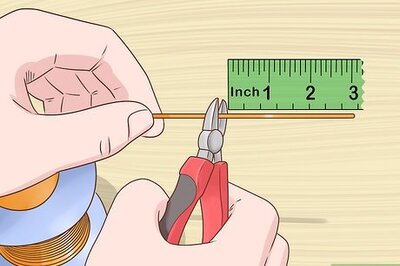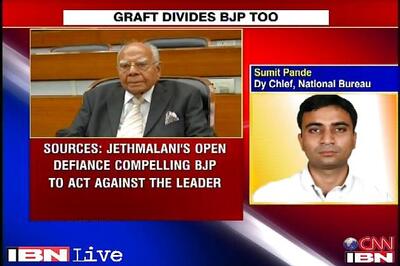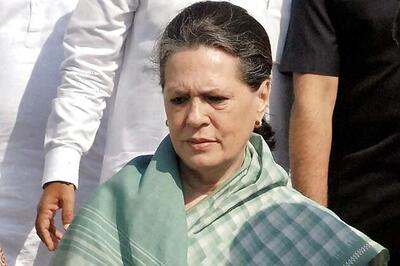
views
New Delhi: he Supreme Court on Friday adjourned the hearing on petitions challenging the validity of Article 35-A of the Constitution to January next year. The Centre and Jammu and Kashmir government referred to upcoming local body polls in state and seek adjournment of hearing on petitions against Article 35 A.
Article 35A, added to the Indian Constitution by a Presidential Order in 1954, also empowers the state's legislature to frame laws without attracting a challenge on grounds of violating the Right to Equality of people from other states or any other right under the Constitution.
The petitions have been filed by an NGO on grounds that it was illegally added to the Constitution as it was never floated before Parliament. Another petition has been filed by Supreme Court lawyer Charu Wali Khanna who said Article 35A was discriminatory against women.
Here’s all you need to know about Article 35A:
WHAT IS ARTICLE 35A?
The article is basically an agreement reached between New Delhi and Srinagar in 1952, added to the Constitution through a presidential order of 1954, according to which no one except the permanent residents will be able to settle permanently in the state, acquire immovable property, avail government jobs, scholarships and aid.
WHO ARE PERMANENT RESIDENTS?
According to the original definition, fixed by the then Maharaja of Kashmir, permanent residents or state subjects were are all those who were born or settled within the state before 1911, or after having lawfully acquired immovable property in the state for not less than 10 years prior to that date and their descendants.
Also, emigrants from the state, including those who migrated to Pakistan, are considered state subjects. Their descendants are also considered state subjects for two generations. But this definition was further modified as Article 35A was ratified in the Constitution.
KEY DATES
1927 and 1932
The then Dogra ruler of the state, Maharaja Hari Singh, issued notifications defining state subjects and their rights. It is said that the Dogras from Jammu approached Singh, expressing fears that an influx of people from Punjab would cause them to lose their jobs and land. So the idea behind these notifications was to contain growing Punjabi influence.
October 26, 1947
Maharaja Hari Singh sought urgent military help on October 24 as Afghani marauders, sent by Pakistan, began their rampage. On October 26, he signed the document of accession. Two notable points here. First, the accession by Union of India was only on three subjects — defence, communications and foreign affairs. Second, the final terms of accession weren’t finalised yet.
July 1949
The National Conference founder and the tallest political leader of the Valley, Sheikh Abdullah, began negotiations with the Union of India over the terms of accession.
July 1952
Sheikh Abdullah and Jawaharlal Nehru reached upon some agreements. These came to be known as the Delhi Agreement. One of the points agreed upon by the two parties was that domiciles of Jammu and Kashmir shall be regarded as citizens of India, but the State Legislature was empowered to make laws for conferring special rights and privileges on the state’s subjects.
May 1952
The provision of the state deciding special rights and privileges on its people was added to the Constitution formally through the Constitution (Application to Jammu and Kashmir) Order, 1954, issued by the country’s first president, Rajendra Prasad, on May 14, 1954, through powers conferred by clause (1) of Article 370.
November 1956
The state’s constitution (J&K has its own constitution, its own flag and own penal code) was adopted. It defines a permanent resident as one who was born or settled in the state before May 14, 1954, or who has been a resident of the state for 10 years and has “lawfully acquired" immovable property in the state.
WHAT’S THE CHALLENGE TO ARTICLE 35A?
In 2014, a little-known NGO approached the Supreme Court challenging Article 35A on the grounds that it was illegally added to the Constitution as it was never floated before Parliament.
In July 2017, Supreme Court lawyer Charu Wali Khanna also challenged Article 35A on the grounds that it was discriminatory towards women.
“Article 14 of the Constitution gives a fundamental right to equality before law. But 35A is heavily loaded in favour of males because even after marriage to women from outside, they will not lose the right of being permanent residents," she told the court.
Her argument was that while a woman from outside the state shall became a permanent resident on marrying a male permanent resident of the state, a daughter who is born state subject will lose her permanent resident status on marrying an outsider.
At this juncture, it may be important to recall a landmark judgment delivered on October 2002, by the Jammu and Kashmir High Court, which held that women married to non-permanent residents will not lose their rights, though children of such women will not enjoy succession rights.
WHO SAYS WHAT
There is an outrage among Kashmiri Muslims who consider the abrogation of Article 35A as a means by which the Hindu Right wants to cause deep demographic change in the Valley. This is the primary objection raised by the Hurriyat. Some say that abrogation of 35A is the “permanent solution" to the Kashmir issue, which Union Home Minister Rajnath Singh has often talked about. Various political parties have also expressed their anger at the fact that the Centre, through its Attorney General, did not end the controversy by underlining that 35A was untouchable.




















Comments
0 comment